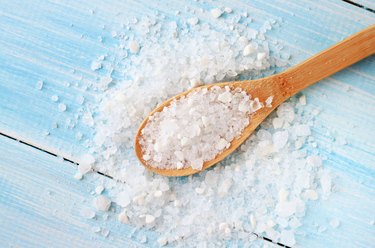
Your body requires some sodium to maintain the correct balance of fluids in your tissues and blood, although too much salt in your diet can raise your risk of developing certain health conditions. Consuming excessive amounts of sodium may increase the amount of urine your kidneys produce, resulting in a condition known as polyuria.
Sodium
Video of the Day
In addition to balancing your body fluids, sodium also helps support proper muscle function and nerve impulses. Although some salt is necessary for optimal health, most Americans consume too much of this nutrient. The recommended maximum amount of sodium for most adults is 2,300 mg per day, according to MayoClinic.com. Adults over the age of 50 should consume no more than 1,500 mg of salt each day. Most people in America consume about 3,400 mg of salt per day, leading to a regular consumption that results in more than twice the recommended amount of this mineral. Salt in your diet can cause excessive thirst, leading to an increase in the amount of water you consume.
Video of the Day
Urination
MedlinePlus defines excessive urine as 2.5 or more liters per day. Your body processes salt through your kidneys. When you consume too much sodium, your kidneys process and excrete the excess through urine production. Excessive thirst is a common response to eating salty foods. An increase in fluid consumption leads to an increase in urine production.
Considerations
Although drinking more fluids in response to an increase in salt consumption is one of the main reasons for excessive urine production, other conditions can cause symptoms of polyuria. Common causes of increased urination include diabetes, kidney failure, sickle cell anemia and psychogenic polydipsia. Certain medications may also cause an increase in urination.
Precautions
Notify your doctor for symptoms of excessive urination and excessive thirst that do not respond to a decrease of sodium in your diet. Although frequent urination can be an annoyance, consuming excessive amounts of salt also poses serious health risks. Research indicates that eating too much salt can raise your blood pressure, according to the Centers for Disease Control and Prevention. The CDC warns that high blood pressure contributes to approximately 400,000 deaths each year. Control your salt intake by cutting back on table salt and reading the labels on processed and packaged foods.